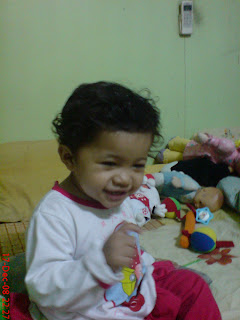Coping with tantrums
>> Thursday, January 8, 2009
Written by childcare expert and author Penelope Leach
Avoiding tantrums 
Although tantrums are part of daily life with some toddlers, they may be much less frequent or rare with others. However liable your child is to tantrums, though, you can prevent many by organising your toddler's life so that frustration stays within the limits of her tolerance most of the time. It's always worth avoiding tantrums if you can do so without compromising your own limits, because they do no positive good to either of you. When you must force your child to do something unpleasant or forbid something she enjoys, do it as tactfully as you can. When you can see that she is getting angry or upset about something, try to make it easier for her to accept. Of course she must have her coat on if that's what you have said, but perhaps she needn't have the zipper done up yet? There is no virtue in challenging children with absolute "dos" and "don'ts" or in backing them into corners from which they can only explode in rage. Leave a dignified escape route.
 What to do if your toddler has a tantrum
What to do if your toddler has a tantrum
Remember that her overwhelming rage terrifies her; make sure she does not hurt herself, or anyone or anything else. If she comes out of a tantrum to discover that she has banged her head, scratched your face or broken a vase, she will see the damage as proof of her own horrible power and evidence that when she cannot control herself, you do not have the power to control her and keep her safe, either.
It may be easiest to keep your toddler safe if you hold her, gently, on the floor. As she calms down, she finds herself close to you and she finds, to her amazement, that everything is quite unchanged by the storm. Slowly she relaxes and cuddles into your arms. Her screams subside into sobs; the furious monster becomes a pathetic baby who has screamed herself sick and frightened herself silly. It is comfort time.
A few toddlers cannot bear to be held while they are having tantrums. The physical restriction drives them to fresh heights of anger and makes the whole affair worse. If your child reacts like this, don't insist on overpowering her. Remove anything she is obviously going to break and try to fend her off from physically hurting herself.
Don't try to argue or remonstrate with the child. While the tantrum lasts, she is beyond reason.
Don't scream back if you can possibly help it. Anger is very infectious and you may well find yourself becoming angrier with every yell she utters. Try not to join in. If you do, you are likely to prolong the outburst because just as the toddler was about to calm down, she will become aware of your angry voice and it will start her off again.
Don't let the child feel rewarded or punished for a tantrum. You want her to see that tantrums, which are horrible for her, change nothing, either for or against her. If she threw the tantrum because you would not let her go out into the garden, don't change your mind and let her out now. Equally, if you had been going to take her for a walk before she had the tantrum, you should take her all the same, as soon as she is calm again.
Don't let tantrums embarrass you into kid-glove handling. Many parents dread tantrums in public places but you must not let your toddler sense your concern. If you are reluctant to take her into the corner shop in case she throws a tantrum for sweets, or if you treat her with saccharin sweetness whenever visitors are present in case ordinary handling should provoke an outburst, she will soon realise what is going on. Once your toddler realises that her genuinely uncontrollable tantrums are having an effect on your behaviour towards her, she is bound to learn to use them and to work herself up into the semi-deliberate tantrums which are typical of inappropriately handled four-year-olds.
Handling tantrums 
Assume that your child will not have a tantrum; behave as if you had never heard of the things and then treat them, when they occur, as unpleasant but completely irrelevant interludes in the day's ordinary events. It sounds easy, but it is not. I once visited a friend whose 20-month-old boy asked her to take the cover off his sandpit. She said, "Not now, nearly time for your bath," and returned to our conversation. The child tugged her arm to ask again but got no response. He then went to the sandpit and tried in vain to open it himself. He was tired and the frustration was too much for him. He exploded. When the tantrum was over and his mother had comforted him, she said to me: "I feel really mean. That was all my fault; I just didn't realise he wanted to play in the sand that badly." And she took the cover off for him after all.
That mother's behaviour was easy to understand but also an excellent example of how not to handle tantrums! She said "no" to the child when he first asked for help without giving any real thought to his request. The child's own efforts to uncover the sand did not show her how passionately he wanted to play there because she was not paying attention to him. Only when he threw a tantrum did she realise that he really did want that sand and that there really wasn't any good reason for forbidding it. Of course she meant to make it up to the toddler by giving in after all, but it was too late for second thoughts. Hasty though it was, she should have stuck to her original "no" because by changing it to "yes" after the tantrum she must have made her child feel that his explosion had had a most desirable effect. It would have been better for both of them if she had taken a moment to listen and think when the toddler asked for help, rather than giving in when he screamed.
It is not easy being a toddler, rocking wildly between those anxious and angry feelings. It is not easy being a toddler's parent, either, striving to stay on the centre of that emotional see-saw and to hold it in equilibrium. But time is on everybody's side. A lot of the emotional turbulence will have settled down by the time your toddler has completed her metamorphosis into a preschool child.
Outgrowing tantrums
Your toddler will get bigger, stronger and more able to manage things better; that means that she will meet less extreme frustration in her everyday life. She will get to know and understand more, too, so that her life contains fewer frightening novelties. As she becomes more fearless, she will stop needing quite so much reassurance from you. And gradually she will learn to talk freely not only about the things that she can see in front of her but about things she is thinking and imagining. Once she can talk in this way, she will sometimes be able to accept reassuring words in place of continual physical comfort. With the help of language she will also learn to distinguish between fantasy and reality. Once she reaches this point, she will at last be able to see both the unreality of most of her worst fears and the reasonableness of most of the demands and restrictions which you place on her.
She will turn into a reasonable and communicative human being. Just give her time.





4 comments:
Aww cute post!
P.S. - I tagged ya with an award. :)
Alahai...comeynyer dia dah besar! lamanye tak jumpa. Bile mama syakira nak bawak jumpa untie bai yg comel?
P.S. - I awarded ya with something over at my blog. :)
cumei nyee nak geget2 la
Post a Comment